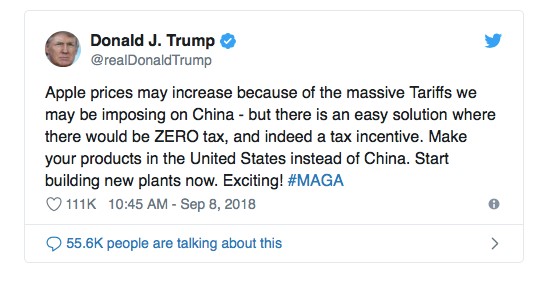If negotiations with Beijing fail at the G20 this week, Trump is prepared to push the tariff limits by targeting another $267 billion in goods, and that could include a 10-percent tariff on iPhone.
Dropping the iPhone bomb specifically during an interview with the Wall Street Journal shocked Apple stock in after-hours trading, causing it to shed 1.5 percent, before it pared some of that loss Tuesday morning:

(Click to enlarge)
"If we don't make a deal, then I'm going to put the $267 billion additional on," at a tariff rate of either 10% or 25%, Trump told WSJ.
And with regard to the Journal’s question about whether iPhones or other consumer electronics would be part of that retribution, Trump said: "Maybe. Maybe. Depends on what the rate is. I mean, I can make it 10%, and people could stand that very easily."
The tendency is for markets to react immediately, and usually sharply, to Trump comments of this nature, and then rebalance after there has been time to digest overnight. But most have figured out by now that this is Trump’s negotiating style—ramp up the threats on the eve of the next big meeting. He’s upping ante for more leverage ahead of the G20 Related: Online Shopping Just Got More Expensive
Apple managed to avoid the most recent round of tariffs that came out in September, but fears have now been renewed and all eyes will be on the G20 in Argentina, which starts off on 30 November and closes on 1 December.
For iPhone, what happens in Argentina is decisive.
Import taxes on the iPhone would increase prices and potentially harm sales. And while Apple CEO Tim Cook doesn’t think—or didn’t think, earlier—that Trump would target iPhone, all bets are now off as the U.S. president seeks more leverage against China.
And moving iPhone production to the U.S. isn’t much of an option, despite Trump’s tweet suggesting such back in September.

(Click to enlarge)
Venture capitalist Gene Munster of Loup Ventures, told CNBC that relocating Apple to the U.S. would be a “massive” undertaking more difficult than moving “the moon off its orbit”.
"We're talking about something that would take five-plus years to do. There's near a million people, even with the cuts at Foxconn, that work on Apple products in China," he said.
Either way, the iPhone would get much more expensive. In a September note to clients, Bank of America Merrill Lynch said that moving production (100% of final assembly) to the U.S. would need 20% price increases to offset the incremental labor costs”.
All the more reason for investors to start looking at Apple’s strategic direction—and it’s not just about iPhone, or even its other key consumer electronics.
In early October, JPMorgan predicted Apple would get 20 percent more valuable by the end of December 2019. And while the iPhone has gotten it to where it is, the future is about the Big Shift to services.
Fewer iPhone users are expected to upgrade to new phones next year because they like the iPhone X so much, so many analysts see a major sales gap looming for next year.
According to JPMorgan analyst Samik Chatterjee, "Apple has historically been regarded as an IT Hardware company tied to a short product refresh cycle of the iPhone in an extremely competitive smartphone industry."
Related: Bitmain Faces $5 Million Lawsuit
"More recently, investors have been proved wrong on the pace of Apple’s transformation to a services company, with revenues in the Services reporting segment increasing from 8% of total in FY12 to an estimated 20% of total in FY21E," he added.
So, we’re not really talking about the iPhone anymore—we’re talking about App Store, Apple Music and Apple Pay—not to mention its push into video and print media. We’re also talking about other juicy new acquisitions Apple could make.
In July, Apple became the first-ever publicly listed U.S. company to hit $1 trillion when share prices hit $207.05 on the morning on July 2nd. It managed to soar way past that in the coming days, but last month saw stocks drop on disappointing outlook for the holiday season, and it lost that royal membership again.
But while investors should be looking at Apple’s service potential more closely, they’ll also be looking at Microsoft, which managed to overtake Apple briefly on Monday, when Apple’s market cap fell to $812 billion and Microsoft’s rose to $819 billion.
“It most likely won’t be long until Microsoft is firmly entrenched again as No. 1 in the world,” Bloomberg’s Shira Ovide wrote. “Longer-term, Microsoft has continued to roll as the go-to shepherd for corporate clients anxiously navigating technology changes in their industries.”
And Trump’s tariff threats certainly aren’t helping, with everyone wondering if Apple—with Tim Cook working hard to stay in Trump’s good graces—can “shepherd” its way out of this.
By Michael Kern for Safehaven.com
More Top Reads From Safehaven.com:
















